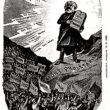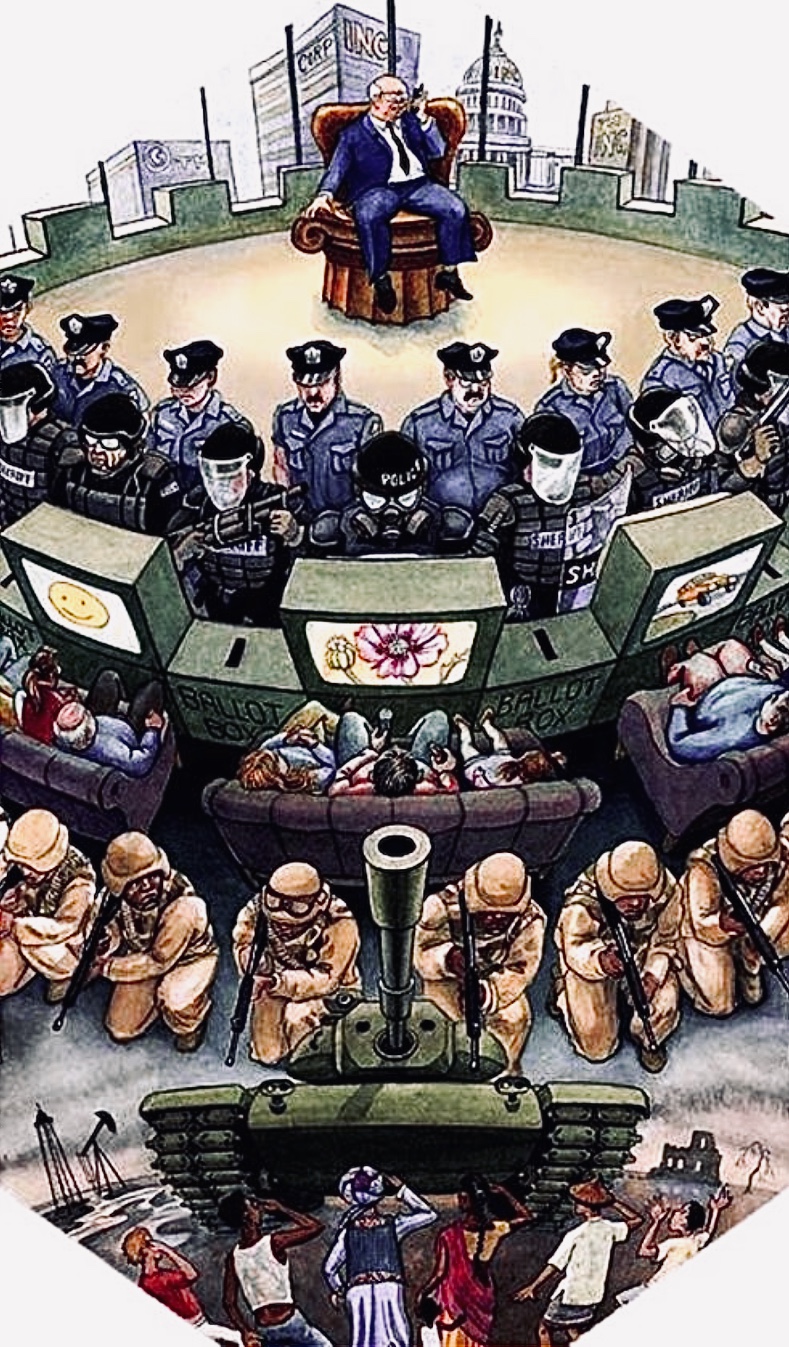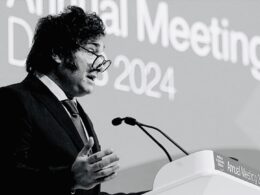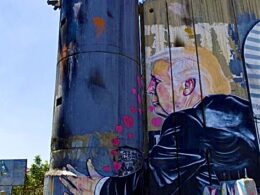“The pace of oppression outstrips our ability to understand it, and that is the real trick of the Imperial thought machine,” says Nemik, the writer and guerrilla fighter from the critically acclaimed recent Star Wars series Andor. “It’s easier to hide behind forty atrocities than a single incident.” This statement is a continuation of the commentary on U.S. imperialism that Star Wars was from the start intended to be. George Lucas observed the profound violence of imperialism, whereas Andor observes the ways in which today’s imperialism is perpetually intensifying its violence while using that intensity to keep the evil concealed.
It was obvious to Lucas and the rest of his generation that his government represents a malevolent and destructive force. Even if many among this generation sold out, the brutalities of U.S. militarism that they witnessed made the American experiment’s moral bankruptcy impossible for them to deny. The infamous war crimes that Washington carried out during its terror campaign against Vietnam, and the rationale behind this campaign of trying to stop the spread of communism, showed the inherently violent nature of not just the United States but capitalism itself. As the motivating force behind the evils that Washington committed in Vietnam, and that it’s committed in so many other places, is capital accumulation.
The partisans of the existing social order who are honest about their goals argue that violence is innate to conflicts between social systems, and that because the system of capital accumulation is supposedly the best one available, capitalism’s violence is necessary. The context they leave out is that this system stopped being the optimal one two centuries ago, when the bourgeoisie finished replacing the feudal aristocracy as the globe’s primary ruling class. Marx and Engels recognized that capitalism’s rise was necessary for getting society beyond the limitations feudalism imposed. It was clear to them that capitalism had benefits within this context. The great lie this system’s defenders tell is that centuries later, it still represents the epitome of what’s realistically possible for civilization to reach, that capitalism didn’t become outmoded the moment it fully supplanted the previous order.
The truth is that even in places where the means of production have not yet developed enough for society to progress to the next phase, such as Russia in 1917 or China in 1949, the bourgeoisie have not had to remain in power for society to undergo a further rise in living standards. In these cases, the political domination of the bourgeoisie was only holding back the goals of lifting everyone out of poverty, and of industry becoming adequately developed. In Russia and China, workers democracy had to be established in order for private business to be utilized to the effect that living standards were lifted up. In Russia this looked like Lenin’s New Economic Policy of using capital to build up the country’s underdeveloped economy, and in China this looked like Deng’s adopting the New Economic Policy to solve China’s equivalent deficiencies.
Capital was momentarily needed in these instances, but the dictatorship of the bourgeoisie was not. This is because it was in the bourgeoisie’s interests to keep these societies underdeveloped, whereas it was in the proletariat’s interests to carry out development. Then when capital was utilized to sufficiently build the productive forces, capital was discarded, as it became no longer necessary. This happened in Russia after the NEP was replaced by the highly nationalized Soviet economy, and it’s now happening in China as Xi Jinping incrementally replaces the Dengist economy with a nationalized paradigm. In both of these cases, the people saw massive rises in their quality of life, with the Soviet people having come to enjoy lifestyles that in many ways rivaled those of Americans. The Chinese people are seeing the equivalent benefits, with 900 million Chinese having been lifted out of poverty since Deng applied the NEP. Now absolute poverty is nonexistent in China, something that can’t be said for the USA. In the USA it’s going up, and has been steadily doing so during the same decades China has been bringing it down.
The dictatorship of the bourgeoisie’s goal is to prevent this and other types of progress. The power of the capitalist ruling class depends on perpetuating suffering, death, and destruction. You could even say that the oligarchs take pleasure in the deaths that their policies cause. Every working class person who perishes from Covid-19, every Palestinian child who’s murdered by the IDF, and every family that’s blown up by a drone strike represents a potential political enemy of capital who’s been defeated. It benefits the elites even when individuals who aren’t politically challenging them die as a consequence of the system, because that means there are less people who might participate in revolution. The ruling class is sociopathic and sadistic, because the system that produced this class is sociopathic and sadistic.
The longer this system has managed to outlast its initial usefulness, the more it’s taken on this characteristic of inhumanity. What was at first a way to transcend an outmoded system became cancerous, requiring endless growth and consumption in order to survive. Consequently, this new system itself became outmoded. Its rulers hijacked the functions of the state to gain a monopoly on force, which it used to inflict incomprehensible bloodshed to keep itself in power. When capitalism reached its highest stage, that being the stage in which it exports capital to achieve perpetual expansion, it gained the capacity to inflict violence on unprecedented scales.
During this stage, King Leopold has carried out his genocide against Africans, the Third Reich has carried out the Holocaust, and the CIA has carried out its comparably deadly counterrevolutionary warfare operations. With these and capitalism’s other great crimes, like U.S. imperialism’s wars, there’s been a continuation of the colonial genocides that started off the original capital expansion period. The more in need of growth the machine has become, the more bodies it’s sacrificed.
In the cornered situation that the ruling class now finds itself, where U.S. hegemony is disappearing and the globe’s capitalist hub therefore finds itself unable to expand into new markets, the system’s only recourse is to cannibalize itself. This means a constant increase in necro-capitalism. “Necro” means when lives are taken, which in this sense means the elites using their social status to decide who lives and dies. Capitalism has always been necro, with the 21st century representing the point when the degree to which capitalism acts like this is brought ever upward so the machine can be fed.
The scale of the evils that are coming about from this process is so all-encompassing that when one hasn’t examined capitalism’s consequences on a macro scale, it can be impossible to see what the process looks like. The system is producing too many violations of human rights, and too many destructive impacts upon the wider biosphere, for the system’s vile nature to be initially visible. But when the diverse array of horrors is listed together, necro-capitalism’s presence becomes apparent.
Necro-capitalism looks like millions of lives being sacrificed worldwide during the pandemic so that corporations can keep their profits up. It looks like our ruling institutions knowingly exacerbating the climate crisis to protect the fossil fuel industry, a decision that’s anticipated to take over 80 million lives by the century’s end. It looks like the continuation of a half-century neoliberal austerity program via union busting. It looks like the construction of the largest carceral state on the planet, and the militarization of a police force that’s proven itself many times to be a human rights menace. It looks like drone wars and bombing efforts that have come to regularly take place in at least half a dozen countries since the War on Terror began. It looks like sanctions that in effect amount to genocides against the people of Iran, Venezuela, Syria, and the other countries where Washington’s economic warfare is capable of bringing hunger. It looks like a project to militarily occupy historically colonized places like Africa, and consequently terrorize the locals, in an effort to counter China. It looks like new efforts at preventing Latin America’s liberation, whether through sending troops to prop up Haiti’s neo-colonial regime or a coup in Peru. It looks like efforts to back the genocides that are being committed by Israel, Saudi Arabia, India, and fascist Ukraine, all to try to gain geopolitical advantages. It looks like the fomenting of civil conflicts in Ethiopia, Myanmar, and other geopolitically significant countries, even if this leads to famines and refugee crises.
Every one of these developments is directly traceable to a tangible and specific factor: the drive to accumulate capital. The partisans of the existing order put forth stories about Washington’s adversaries committing human rights abuses, being anti-democratic, or violating NATO’s concept of what “international law” should be. They compile lengthy collections of sources to make it look like these stories are beyond doubt, yet these sources all get their information from the same network of intelligence agents, paid defectors, dishonest researchers, and NGOs. When you examine the core motive of why these actors promote anti-communist narratives and NATO war propaganda, it’s clear they do so to defend the existing power structure. Upholding peace and human wellbeing is the last thing they care about, or they wouldn’t be aiding the side that depends on sabotaging these things.
When communist governments have failed to uphold peace and wellbeing, Marxists have learned from the mistakes of their predecessors. China’s modern communist party has denounced the cruel catastrophe which was Mao’s Cultural Revolution, and has adopted a foreign policy model different from the ultra-leftist one which led the PRC to support Pol Pot. Xi Jinping has also repudiated the Soviet leadership’s fatal mistake of abandoning the state as an instrument for class struggle, and responded to China’s anti-corruption protests by carrying out a merciless campaign against corrupt officials and businessmen. The U.S. government will never learn from its mistakes, because they aren’t mistakes. They’re the tools that capitalism uses to function. Policies that destroy the livelihoods of working people, wars that destroy nations, the arming of abusive law enforcement—these and all the other ways in which the capitalist state “fails” to satisfactorily govern actually represent successes for the ruling class. These things are indispensable for keeping the ruling class in power.
Pointing out how capitalism has been becoming more necro during our generation, and is going to become moreso as its crises intensify, shouldn’t be the basis on which we have to argue for revolution. The reality is that this system has always involved committing injustices against the great majority of the globe, making it so that for those across the peripheral countries, the concept of “saving our future” is out of date. These peoples got their future stolen from them centuries ago, first with colonialism’s plunder and then with how colonialism has been kept alive through modern capital exports. They’re trying to find a way out of the apocalypse that imperialism engineered for them long ago.
It’s in them, and those within the core countries who’ve also been disenfranchised, where the movement for liberating the globe is based. None are better capable of understanding the impacts of this system than the ones who’ve most directly felt the suffering the system creates. This suffering comes in the form of generational trauma, like with black and indigenous communities confronting colonialism’s crimes or with people in countries like Cambodia and the DPRK recalling the bombs Washington dropped on them. As well as in the form of harm that’s now being actively perpetrated, like massacres by Peru’s coup regime or the ways mass incarceration breaks entire families. These are the things that matter, not the hypocritical “human rights” concerns of the liberals who attack Washington’s geopolitical challengers.
Those who’ve been scarred by the social system that liberalism represents have no reason to listen to these calls to hate Washington’s adversaries. If anything, they have reason to have affection for these countries, due to their weakening the imperial structure. With education, organization, training, and mobilization, those cast aside by capital will rise to exact justice. They’ll then join these countries in the construction of a new world, a world where exploitation and subjugation no longer define state policy. After that point, the state itself will become an unnecessary appendage of the old order, as it will no longer be needed to fight against bourgeois power. The state will then wither away, like it’s already been in the DPRK. Society will have advanced to its next stage.
—————————————————————————
If you appreciate my work, I hope you become a one-time or regular donor to my Patreon account. Like most of us, I’m feeling the economic pinch during late-stage capitalism, and I need money to keep fighting for a new system that works for all of us. Go to my Patreon here.








